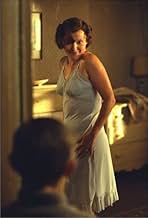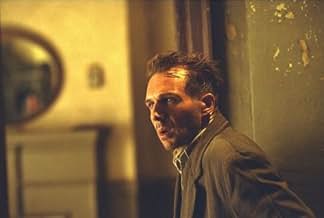NOTE IMDb
6,7/10
42 k
MA NOTE
Un homme souffrant de troubles mentaux s'installe dans une maison de transition. Son esprit retombe progressivement dans le monde créé par sa maladie, où il rejoue un épisode clé de son enfa... Tout lireUn homme souffrant de troubles mentaux s'installe dans une maison de transition. Son esprit retombe progressivement dans le monde créé par sa maladie, où il rejoue un épisode clé de son enfance.Un homme souffrant de troubles mentaux s'installe dans une maison de transition. Son esprit retombe progressivement dans le monde créé par sa maladie, où il rejoue un épisode clé de son enfance.
- Réalisation
- Scénario
- Casting principal
- Récompenses
- 13 victoires et 25 nominations au total
Avis à la une
David Cronenberg's film, based on a novel adapted by its author, Patrick McGrath, is set in London in the late 1980's, and explores the effects of an infamous Conservative government policy, whereby expensive, outdated mental hospitals were streamlined and the inmates released with limited supervision, a process that was termed Care in the Community. The film focuses on Spider, an elusive mental patient, institutionalised for most of his life, now released and returned back to a halfway house in East London, the place of his childhood, to fend for himself in the outside world.
This does not look to the uninformed like a Cronenberg film, there being no teleportation, telepathic head-blowing or the like, but once viewed, the film is clearly in Cronenberg's territory. From the beginning of the 1990's, he has seemed to be searching (it seems to me at times desperately) for new subjects in which to explore his morbid fascination. This fascination concerns the consequences of illness. Illness is given outrageous forms in his earlier films, a car accident which debilitates Christopher Walken in The Dead Zone, for instance, one of its effects being morbid clairvoyance. In Spider, Cronenberg focuses on the effect of illness on the brain, with its manifestation in what we would call the real world, when scientists actually view our 'real' world as a simulation made by our brains (and therefore our bodies).
As ever, Cronenberg, unlike other directors, does not condescend and go for the easy option, in other words making Spider a neatly disturbed, good-looking human, glamorised by his tragic sense of unreality, i.e. A Beautiful Mind. Instead, he really explores what it might be like for an intelligent man who tries to make sense of a world and past warped by mental disturbance, and questions his perception and sense of reality. Cronenberg gives Spider pathos and humanity, but never glamorises him.
Ralph Fiennes inhabits Spider naturally and impressively, bringing to the role his consistent qualities of commitment and intensity. The supporting cast is wonderful. Gabriel Byrne plays Spider's father with his rich sourness and Miranda Richardson, in a double role, shows why she is such a hidden, rough gem of British acting (at least to the wider world).
In Spider, Cronenberg Is Back To His Best With A Characteristically Original Film About Society and Mental Illness
This does not look to the uninformed like a Cronenberg film, there being no teleportation, telepathic head-blowing or the like, but once viewed, the film is clearly in Cronenberg's territory. From the beginning of the 1990's, he has seemed to be searching (it seems to me at times desperately) for new subjects in which to explore his morbid fascination. This fascination concerns the consequences of illness. Illness is given outrageous forms in his earlier films, a car accident which debilitates Christopher Walken in The Dead Zone, for instance, one of its effects being morbid clairvoyance. In Spider, Cronenberg focuses on the effect of illness on the brain, with its manifestation in what we would call the real world, when scientists actually view our 'real' world as a simulation made by our brains (and therefore our bodies).
As ever, Cronenberg, unlike other directors, does not condescend and go for the easy option, in other words making Spider a neatly disturbed, good-looking human, glamorised by his tragic sense of unreality, i.e. A Beautiful Mind. Instead, he really explores what it might be like for an intelligent man who tries to make sense of a world and past warped by mental disturbance, and questions his perception and sense of reality. Cronenberg gives Spider pathos and humanity, but never glamorises him.
Ralph Fiennes inhabits Spider naturally and impressively, bringing to the role his consistent qualities of commitment and intensity. The supporting cast is wonderful. Gabriel Byrne plays Spider's father with his rich sourness and Miranda Richardson, in a double role, shows why she is such a hidden, rough gem of British acting (at least to the wider world).
In Spider, Cronenberg Is Back To His Best With A Characteristically Original Film About Society and Mental Illness
After seeing every single Cronenberg film I've been able to find, I've come to one simple conclusion: I've seen entirely too little of his works. I have yet to see one film of his that I found a complete waste of time(though I did not find much point in The Brood). This is quite possibly my favorite film of his yet, and I guess that says something about how few of his films I've seen(as this seems like one of his more unappreciated films). The film is quite dark and bleak. It has a fairly slow pace, but there's plenty of atmosphere and I never really felt like turning it off. The plot is very good, and I liked the way it developed somewhat out of joint, with little continuity other than the main plot-line. The acting is superb. One actress performs two roles, and does so with such talent that I never realized they were being portrayed by one and the same person. I only discovered this after checking out the cast list. Spider is a very unsettling film, but I suppose Cronenberg has done far better in other films. For some reason, I just found this the more easily accessible of his films, the one that requires least afterthought to be understood, to decipher what he wanted to say. All of the other films by him that I've seen, I've required to basically 'be told' what the film was about... with this one, I thought for a while after seeing it, and figured it out, put the pieces together myself, without much difficulty. Maybe that's a problem for the film... it's too simple. It's far more simple than the usual Cronenberg, and that is what makes me like it more, and his more experienced and analyzing fans like it less. I recommend this film to any fan of Cronenberg and/or dark films. Don't expect to be able to figure out the film from just one viewing, and don't take anything you see in it at face value. 8/10
This film is one of the most under-rated, I have to say. I know it takes awhile to get into and you have to use your mind while you watch it but it's not THAT complicated, is it? Especially if you watch this film more than once you really become to understand what it is it with Spider. I don't want to give away the plot, because you really have to see it for yourself. It's surprising and pleasantly different.
I have to highlight the acting in the film, it's that superb. All the actors are just simply amazing, taking the acting to a completely new level. So, if you want to try something that's not so mainstream film-making, watch Spider. I dare you.
I have to highlight the acting in the film, it's that superb. All the actors are just simply amazing, taking the acting to a completely new level. So, if you want to try something that's not so mainstream film-making, watch Spider. I dare you.
This film kept me totally engaged during every single second. The acting was no less than you would expect from such a talented cast - brilliant performances from all. Ralph Fiennes is just superb. Gabriel Byrne in probably the most difficult role of his career to date keeps the `secret' to the end. John Neville and Lynn Redgrave, provide the supporting roles with a flare that never upstages the lead actors. Bradley Hall as the Boy Spider gave a fine performance as only child actors can. But it was the Chalk and Cheese characters play by Miranda Richardson that for me stole the show and clearly shows how deep her talents run.
The script, adapted by the author of the book, was powerful without going over the top and was very authentic. Even throwaway lines by supporting actors had meaning and helped convey the power and momentum of this masterpiece `.. seven packets of Crisps and a packet of Embassy.' Many times have I uttered similar words in a London Pub.
The locations were so real, you could smell and tasted them - I grew up in such a places and in the same period as the Boy Spider - every single and highly accurate detail brought my childhood memories rushing back.
The story is real - events like the critical event in this film really did happen and still do.
For international readers, England from the late 70's onwards adopted a 'Care in the Community' programme and every city and major town has halfway houses, like the one portrayed in this film, where newly released inmates of mental institutions are ordinarily just dumped to fend for themselves.
This film is nothing short of a Masterpiece - the real pity is that it won't appeal to a wider international audience.
The script, adapted by the author of the book, was powerful without going over the top and was very authentic. Even throwaway lines by supporting actors had meaning and helped convey the power and momentum of this masterpiece `.. seven packets of Crisps and a packet of Embassy.' Many times have I uttered similar words in a London Pub.
The locations were so real, you could smell and tasted them - I grew up in such a places and in the same period as the Boy Spider - every single and highly accurate detail brought my childhood memories rushing back.
The story is real - events like the critical event in this film really did happen and still do.
For international readers, England from the late 70's onwards adopted a 'Care in the Community' programme and every city and major town has halfway houses, like the one portrayed in this film, where newly released inmates of mental institutions are ordinarily just dumped to fend for themselves.
This film is nothing short of a Masterpiece - the real pity is that it won't appeal to a wider international audience.
spider is a strange but beautiful film. don't let yourself be influenced by all the intellectual approaches to define the plot of the movie. it's not necessary. spider whispers a silent story about different perceptions of reality and truth. it is touching and rather adressing the heart than the brain. the story is driven by a strong sexual theme concerning the relationship between mother and son.
the performances are throughout excellent. cronenberg hat created one of his best films. go and see it.
the performances are throughout excellent. cronenberg hat created one of his best films. go and see it.
Le saviez-vous
- AnecdotesDavid Cronenberg received the screenplay from Patrick McGrath out of the blue, with a note attached saying that Ralph Fiennes was interested in playing the part of Spider. After about four pages, Cronenberg had decided that he wanted to do the film.
- GaffesCamera is reflected in broken window of asylum.
- ConnexionsFeatured in SexTV: Dark Desires: Sexuality in the Horror Film (2003)
Meilleurs choix
Connectez-vous pour évaluer et suivre la liste de favoris afin de recevoir des recommandations personnalisées
- How long is Spider?Alimenté par Alexa
Détails
Box-office
- Budget
- 10 000 000 $US (estimé)
- Montant brut aux États-Unis et au Canada
- 1 642 483 $US
- Week-end de sortie aux États-Unis et au Canada
- 5 575 $US
- 22 déc. 2002
- Montant brut mondial
- 5 808 941 $US
- Durée1 heure 38 minutes
- Couleur
- Mixage
Contribuer à cette page
Suggérer une modification ou ajouter du contenu manquant






































